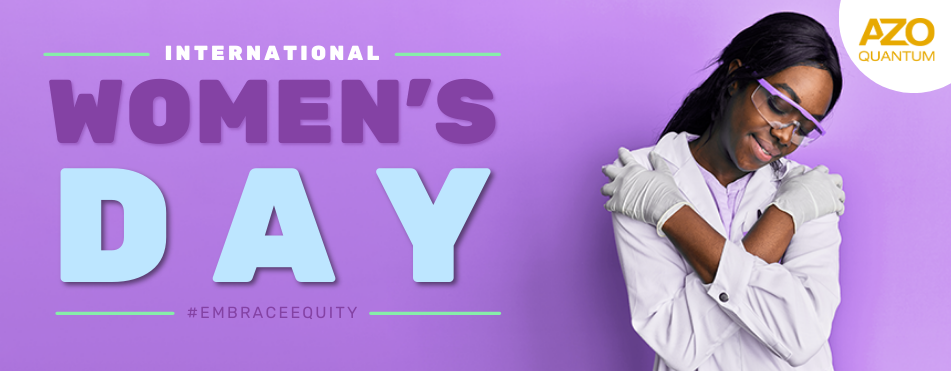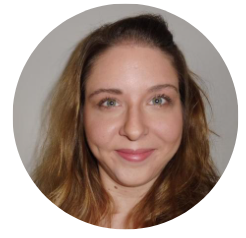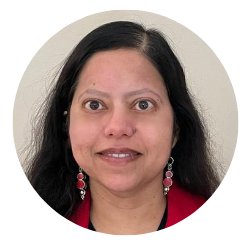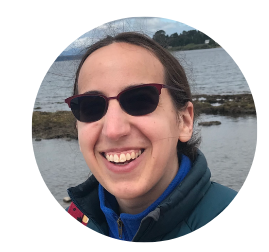
International Women's Day is a World Day celebrating the social, economic, cultural, and political achievements of women globally. This year's theme, 'Embracing Equity', strives to highlight equal opportunities for women in all sectors, while the UN's focus on 'DigitALL' looks at innovation and technology for gender equality.
To celebrate International Women's Day this year on AZoQuantum across both themes, we spoke with three researchers about their work in the field of physics and their advice for women starting out in their domain.
Dr. Judit Szulagyi
 Dr. Judit Szulagyi is a group leader and professor in Computational Astrophysics at ETH Zurich in Switzerland. She is the principal investigator of a 1.3 million EUR European Research Council Starting grant to study the formation of planets. She was selected on the Forbes List “30 under 30 in Science” in 2017 among the most influential young scientists. In 2021, she was awarded the “MERAC Prize for Best Early Career Researcher in New Technology” by the European Astronomical Society.
Dr. Judit Szulagyi is a group leader and professor in Computational Astrophysics at ETH Zurich in Switzerland. She is the principal investigator of a 1.3 million EUR European Research Council Starting grant to study the formation of planets. She was selected on the Forbes List “30 under 30 in Science” in 2017 among the most influential young scientists. In 2021, she was awarded the “MERAC Prize for Best Early Career Researcher in New Technology” by the European Astronomical Society.
Dr. Tulika Bose
 Tulika Bose is a Professor of Physics at the University of Wisconsin-Madison, a Fellow of the American Physical Society, and a member of the Compact Muon Solenoid (CMS) experiment at the Large Hadron Collider (LHC). Bose is currently serving as the Deputy U.S. CMS Software & Computing Operations Program Manager and previously served as the CMS Physics Co-coordinator (2017-2019) and the CMS Trigger Co-coordinator (2014-2016). Her physics interests include precision measurements of Standard Model processes and searches for dark matter, new heavy gauge bosons and top quark partners. Bose is a recipient of the Alfred P. Sloan fellowship and a CMS Distinguished Researcher award. She is currently the Secretary/Treasurer for the APS Division of Particles and Fields (DPF), a member of Particle Physics Project Prioritization Panel (P5), and has previously served on the APS/DPF Executive Committee, the Fermilab Users’ Executive Committee, and the US LHC Users Association Executive Committee. She has a keen interest in outreach, regularly gives public lectures and interviews and is on the Advisory Committee for Symmetry magazine. She serves on several university committees and is currently the chair of the Physics Climate & Diversity committee and a member of the University Faculty Senate.
Tulika Bose is a Professor of Physics at the University of Wisconsin-Madison, a Fellow of the American Physical Society, and a member of the Compact Muon Solenoid (CMS) experiment at the Large Hadron Collider (LHC). Bose is currently serving as the Deputy U.S. CMS Software & Computing Operations Program Manager and previously served as the CMS Physics Co-coordinator (2017-2019) and the CMS Trigger Co-coordinator (2014-2016). Her physics interests include precision measurements of Standard Model processes and searches for dark matter, new heavy gauge bosons and top quark partners. Bose is a recipient of the Alfred P. Sloan fellowship and a CMS Distinguished Researcher award. She is currently the Secretary/Treasurer for the APS Division of Particles and Fields (DPF), a member of Particle Physics Project Prioritization Panel (P5), and has previously served on the APS/DPF Executive Committee, the Fermilab Users’ Executive Committee, and the US LHC Users Association Executive Committee. She has a keen interest in outreach, regularly gives public lectures and interviews and is on the Advisory Committee for Symmetry magazine. She serves on several university committees and is currently the chair of the Physics Climate & Diversity committee and a member of the University Faculty Senate.
Dr. Micheline Soley
 Dr. Micheline Soley is an assistant professor involved in interdisciplinary research and collaborations at the University of Wisconsin-Madison. She holds an assistant professor position in the Department of Chemistry, and she is an affiliate of the Department of Physics. Dr. Soley collaborates with the Department of Statistics, and she is a member of the Wisconsin Quantum Institute and the Chicago Quantum Exchange. Dr. Soley gives lectures, performs research, and collaborates within Wisconsin, nationally, and internationally, including with Canada, England, and Chile.
Dr. Micheline Soley is an assistant professor involved in interdisciplinary research and collaborations at the University of Wisconsin-Madison. She holds an assistant professor position in the Department of Chemistry, and she is an affiliate of the Department of Physics. Dr. Soley collaborates with the Department of Statistics, and she is a member of the Wisconsin Quantum Institute and the Chicago Quantum Exchange. Dr. Soley gives lectures, performs research, and collaborates within Wisconsin, nationally, and internationally, including with Canada, England, and Chile.
Please could you introduce yourself and your main research focus?
Judit Szulagyi
My name is Judit Szulagyi, and I am a group-leading professor in computational astrophysics at ETH Zurich in Switzerland. The main focus of my research is how planets and planetary systems are forming, how our Solar system came to be, and in short: what is our origin?
Tulika Bose
I am an experimental particle physicist, a Professor at the University of Wisconsin-Madison, and a member of the Compact Muon Solenoid (CMS) collaboration working at the Large Hadron Collider.
Micheline Soley
I am Micheline Soley. My research lies at the intersection between physics, chemistry, computer science, and applied mathematics and includes the development of novel algorithms for quantum computers; simulation, analysis, and quantum control of ultracold atomic and molecular systems; and identification of parity-time symmetry in quantum mechanical systems.
From astrophysical discoveries to quantum breakthroughs, the field of physics has advanced significantly over the past decade. What inspired you to pursue a profession in physics, and why do you enjoy it?
Judit Szulagyi
When I was a child, I was really into sciences. As a teenager, I watched science fiction, and that led me to read about astronomical phenomena, such as exoplanets, black holes, quasars, etc. I fell in love with astronomy, and I have been on the same path ever since the age of 13. I enjoy searching for humankind’s big questions: what is our origin, how our planet and planetary system came to be, how many other planets are out there, and whether we are alone in the Universe or not...
Tulika Bose
I was always fascinated by Physics in school – it helped me understand the fundamental nature of the world around me and I could do it without the need to memorize and cram. If you understood something from the first principles of Physics, you knew it for life! I also loved Math but preferred Physics because it had more direct applications.
My favorite quote growing up was Ernest Rutherford’s “All science is either Physics or stamp collecting”!
I love challenges and Physics has so many to offer! During my early undergraduate years, I wanted to be the person who solved the challenge of making controlled thermonuclear fusion reactions happen! Later on, an undergraduate research project that I undertook at Cambridge University instilled in me a love for particle physics. The top quark was discovered around then in the US and excited by the discovery, I ended up coming to the US for graduate school. In the years since, I’ve enjoyed working in large international physics collaborations looking to answer some of the most fundamental questions in physics today - what is responsible for dark matter? What is the matter-antimatter asymmetry in our universe due to? Are there new exotic particles out there? We try to answer these questions using our detector, cutting-edge instrumentation, modern software (incorporating Artificial Intelligence/Machine Learning), and high-performance computing!
Micheline Soley
Chemical physics interests me because it provides a window into how the world works. It is fascinating to consider how atoms are constantly shifting positions inside a solid wooden table or how the movements of a huge number of molecules combine to yield water sloshing in a glass.
In particular, I enjoy how theoretical physics directly connects fundamental mathematical equations for how individual particles behave to a deep understanding of how objects behave often in surprising ways.
With the advent of quantum computing, physics has become exciting for a whole new reason. Now, physics not only provides a fundamental understanding of how the world works but how we might one day use the same physical ideas to address problems currently beyond reach, with applications in fields such as pharmaceuticals, cybersecurity, and energy. I enjoy how scientific understanding and physical theory – mathematical expressions and computations – can combine for real-world outcomes.
According to UN reports, women are still statistically underrepresented in STEM worldwide. What are some of the ways through which hurdles as a result of gender bias can be overcome?
Judit Szulagyi
There needs to be more prevention of sexual harassment, bullying, and sexist condescension against women, as well as harsher punishment for the perpetrators. Still today, often there are no regulations in certain countries against unprofessional conduct due to local cultural norms. Science is international, so rules should be the same everywhere too; women in science should be equally protected no matter which country they work in.
Once these issues are properly addressed, gender bias will steeply decline or disappear. Furthermore, women still do not get the same respect as men do, either from colleagues or from students. To counteract this, children should be raised to respect women's authority the same way they do men's. I think things are better than they were 30 years ago or before, we are on the right path forward, but still many more actions and societal changes need to be made.
Tulika Bose
I believe a multi-pronged effort is needed to overcome the many hurdles that women face in STEM – (i) we must raise awareness of the biases that exist through education, training and discussions (ii) adopt strategies that create more opportunities for women (e.g. holistic selection criteria for admissions, integrating diversity, equity and inclusion practices in selection committees, etc.) (iii) create a welcoming, inclusive climate (e.g. by improving communication, creating safe spaces, supporting appropriate work-life balance, etc. ), (iv) provide mentorship and support, and (v) encourage and empower people to speak up against code of conduct violations and support others (e.g. through bystander intervention training).
Micheline Soley
I believe the opposite of gender bias is empowerment, and that empowerment is reached by giving respect, opportunities, and encouragement. Of course, the issues of gender bias are complicated and multifaceted, but I believe they can be surpassed by encouragement and support. I am lucky that I have been empowered by my male supervisors, and that has allowed me to be successful and soar. I am a great believer in empowerment.
Do you have any advice for young women or girls who wish to study or start a career in science?
Judit Szulagyi
My advice is to keep going, if this is your dream, do not let yourself to be deterred. Resilience is the key, as well as trusting your instincts.
Tulika Bose
Dream big and get engaged with science research as early as you can! Doing research yourself can be an extremely fulfilling and rewarding experience. Also, if you work hard and believe in yourself, the sky is the limit – you can do it!
Micheline Soley
The best advice I can give is to follow your passion. Following your passion will feed your soul, will take you far, and is infectious – others will respond positively and will want to help you reach your goals.